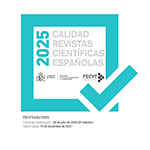La reelaboración hegeliano-lacaniana del materialismo dialéctico según Slavoj Žižek
Résumé
A diferencia de la gran mayoría de autores que han aplicado la teoría lacaniana a la disciplina filosófica en las últimas décadas, el empleo que Slavoj Žižek ha hecho de ella no debería enmarcarse dentro de los horizontes establecidos por el post-estructuralismo, la posmodernidad o la deconstrucción en tanto que ataques contra los grandes discursos filosóficos de la metafísica y la modernidad, sino como un intento, bastante conservador en el fondo, de volver a situar la Filosofía como disciplina fundada en la Verdad. Para lograrlo Žižek reconceptualiza la (ciencia de la) Verdad a partir de una nueva reelaboración hegeliano-lacaniana del materialismo dialéctico que desarrolla los planteamientos del primer Althusser de un modo divergente al realizado por Badiou. Este artículo expone las principales aportaciones realizadas por el filósofo esloveno al materialismo dialéctico, considerándolas como un abandono del materialismo histórico (en el que supuestamente debería basarse el materialismo dialéctico) y un retorno al idealismo absoluto de Hegel.
Téléchargements
##submission.format##
Licence
La revista Logos. Anales del Seminario de Metafísica, para fomentar el intercambio global del conocimiento, facilita el acceso sin restricciones a sus contenidos desde el momento de su publicación en la presente edición electrónica, y por eso es una revista de acceso abierto. Los originales publicados en esta revista son propiedad de la Universidad Complutense de Madrid y es obligatorio citar su procedencia en cualquier reproducción total o parcial. Todos los contenidos se distribuyen bajo una licencia de uso y distribución Creative Commons Reconocimiento 4.0 (CC BY 4.0). Esta circunstancia ha de hacerse constar expresamente de esta forma cuando sea necesario. Puede consultar la versión informativa y el texto legal de la licencia.











